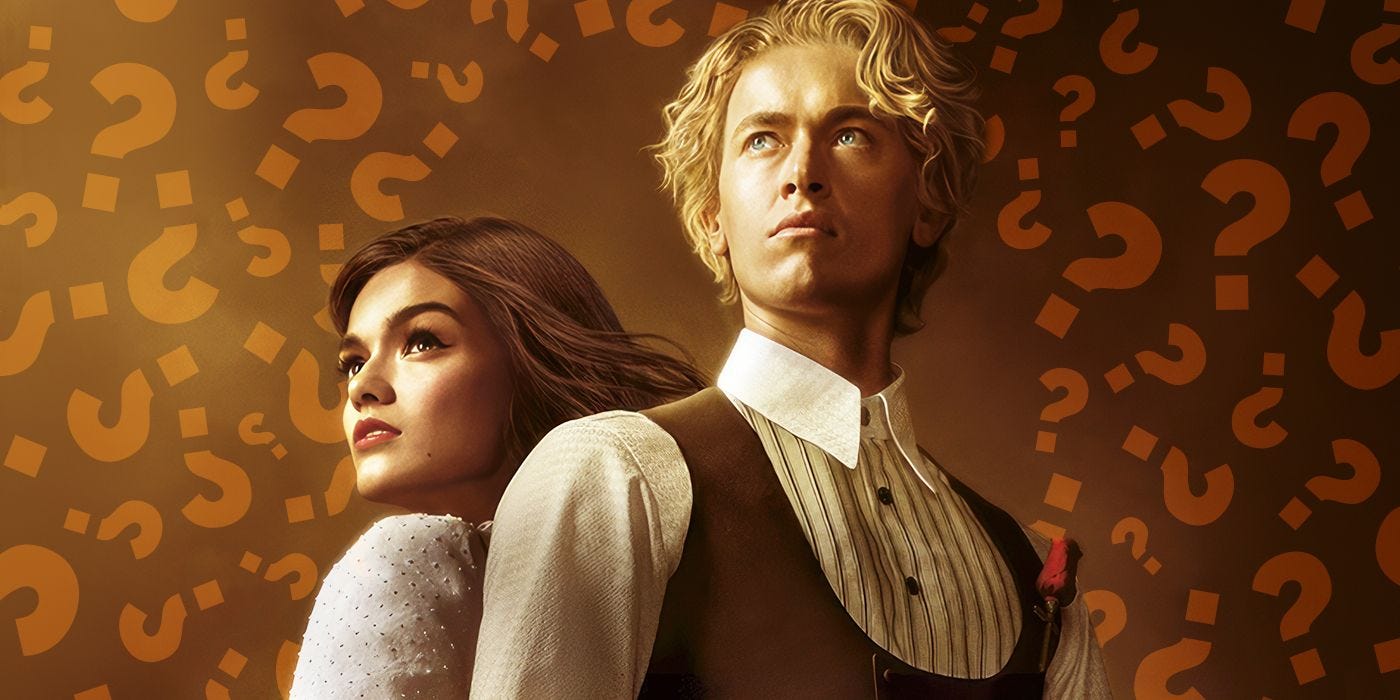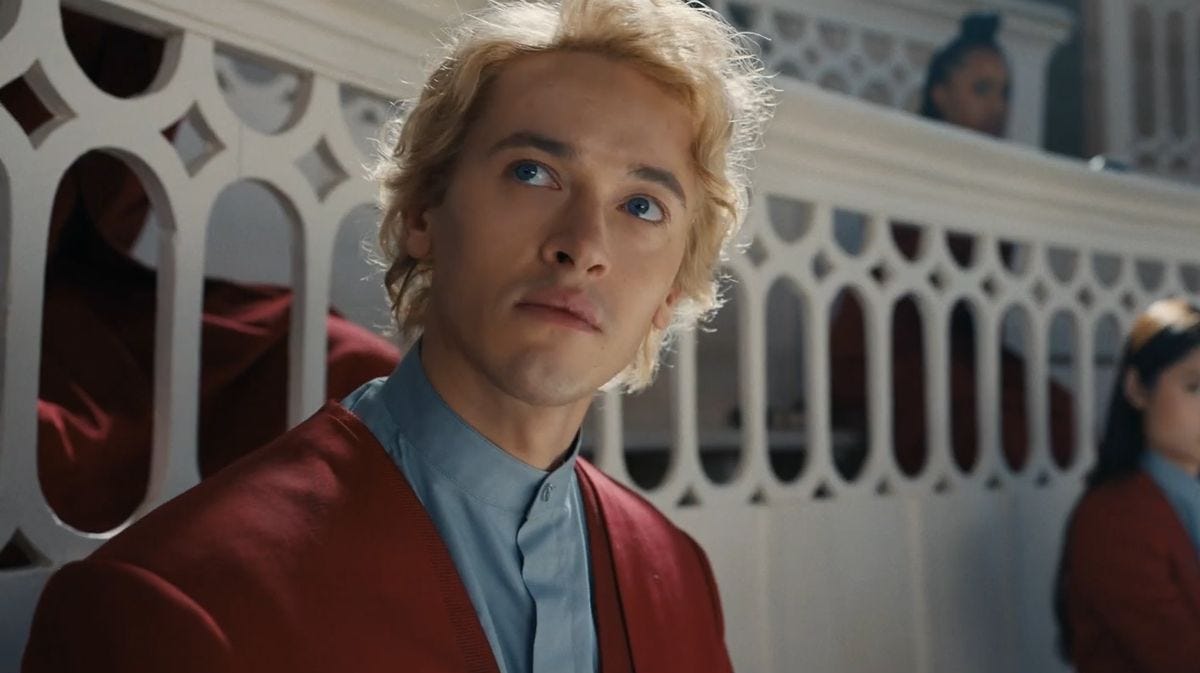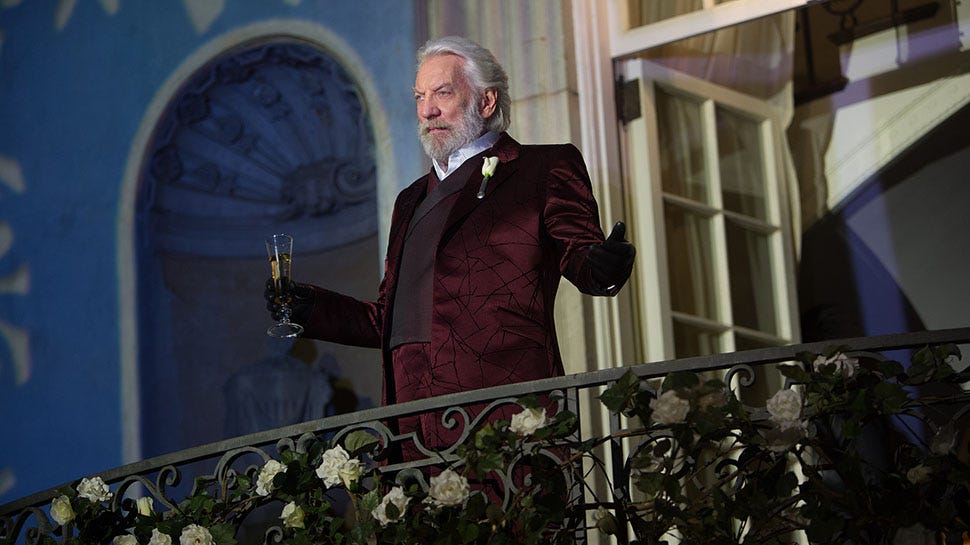The Hunger Games prequel confused me
ballad of songbirds and weird character development
Spoilers ahead! Also, I just want to say that while what I’m going to talk about did irk me about The Ballad of Songbirds and Snakes, I adore The Hunger Games series and think everyone and their dogs should read/watch it. Thnx.
Hello, friends. I’ve been off writing for a while but I’m back now! Anyway, amidst the onslaught of readings for class, I managed to finish The Ballad of Songbirds and Snakes — just in time for the film’s release last November. It isn’t quite the spectacle of the previous Hunger Games films, staying faithful to the book’s aesthetics. But the costumes, acting, and pacing are near-perfect, and Rachel Zegler’s singing is something else. There’s just one thing I couldn’t overlook in both the book and film, and that is the inconsistency of President Snow’s character development.
Ballad traces the history of President Coriolanus Snow: from poor, ambitious boy to psycho dictator of Panem (originally North America before shit happened). If you’re even vaguely acquainted with Hunger Games lore, you’ll know this guy is just pure evil squirming in a meat suit. Ballad is supposed to convince me that he isn’t. Not entirely, at least. Most villains start out as good people. What other point would there be for writing a villain backstory if not to eke out a little empathy?
In general, I find the structure of villain origin stories is similar across all genres: A decent person is betrayed or hurt so badly that it completely breaks their spirit. They conclude that humans are all gross and corrupt; there’s no point in being good, the only way to get what you want is to be bad. So they become bad. Muahahaha. The end.
But such stories also ask important, unanswerable questions, such as: What separates a monster from a man? Can humans also be monsters (therefore rendering them essentially inhuman)? If so, to what extent is it ‘nature’ or ‘nurture’? After all, most of us ordinary folk don’t end up becoming tyrannical despots, and the ones who do are anomalies. Where did it all go so wrong for them?
Suzanne Collins tries to answer these questions by making young Coriolanus “Coryo” Snow a not-so-decent guy in the first place. He’s not wholly terrible, he just tends to prioritise his own interests before others. And why shouldn’t he? After the death of his super-rich parents, his grandmother and cousin are plunged into poverty, though they try their hardest to hide it from the rest of the Capitol’s elite.
Therefore, unlike many villains, Coryo is technically predisposed to evil before the story even begins. This is an important character trait that builds up his story. Ballad isn’t a Bildungsroman of a boy figuring himself out. Rather, it is the breaking of this ‘self’ we bear witness to.
Again and again, Coryo is confronted with life-or-death dilemmas that challenge his values and identity. To betray the state or send his best friend to his death? To run away with the girl he loves, or stay and fulfill his true potential? Poor Coryo is constantly forced to tread the line between what is good and what is right, because what is right isn’t always good, et cetera et cetera. Very harrowing, very complex.
But this overworking of his character is perhaps the inherent flaw that worked against a satisfactory conclusion to his story. You see, despite his self-serving tendencies, Coryo’s first instinct is always to do what is good. He then mulls it over, realises the other less-moral option will serve him better, and chooses that.
It’s apparent to me that his ‘politically correct’ answers in class condoning the Hunger Games are only to get into Dr. Gaul’s good books and avoid punishment. He witnesses a tribute kill his cruel classmate, but shows no obvious abhorration for the act, only horror and even mild sympathy. He betrays his best friend who was working with the rebels, and immediately regrets it. The resulting execution comes as a huge blow because it is not an outcome Coryo expects at all. He also shoots a rebel later on, but the circumstances are dire and he is given little time to think.
The misfortune of others, as a result of his decisions, has always been collateral damage. Coryo has never been “out to get them”. He has never shown a natural inclination to murder. In fact, after all his shenanigans, we still empathise with him, because he is specifically written that way. Collins wants us to see that despite being served the short end of the stick, he responds to the best of his abilities. He is/was mostly innately good. He’s ✨nuanced✨.
So, by the time we get to the end where his bestie is dead and his only hope, Lucy Gray, has fled from him, Coryo’s (very calculated) murder of Dean Casca Highbottom is like a final piece of the puzzle that doesn't fit. The scene occurs in the last few pages of the 500-page book, right before it ends with his (implied )rapid ascend to power. It was so abrupt and out of character that it gave me whiplash. Twice. Since the film made no improvements to this.
If I’m being honest, it ruined the entire story for me. I wish Collins would have either paced his arc more steadily, or written Coryo to be a less rational and earnest person, so that his sudden passion for the systemic murder of children would’ve been at least remotely comprehensible.
But of course, this is just me needing an outlet for my silly little gripes. I don’t think Collins intended for us to pity Coryo and make allowances for him. Ballad is one of those good and necessary villain origin stories, because it explores the dark side of the human condition in a setting that could very well be reality in a few centuries.
It’s surreal to remember that sickos like Hitler and Pol Pot are not just cartoon bad guys in the newspaper or a ‘story’ for a Netflix documentary. They were real people, with real thoughts and feelings. How did they sleep at night knowing they’d murdered millions? What caused such a seismic shift in their consciousness? Who had crossed paths with them and completely missed the signs of a budding genocidal maniac?
Trying to answer these questions ourselves may just help us comprehend the evil that is happening in the world right now.
Sure, much of The Hunger Games’s success can be attributed to its timely release in 2005-2010, when the YA sci-fi/fantasy craze was at its peak and Hollywood was milking that moomoo for all it was worth. But what truly allowed it to withstand the test of time — and beat down the clamouring wannabes (*cough* Divergent *cough) — is its comprehensiveness and accessibility.
Suzanne Collins understood the 5 Hs and 1 W of her vision, and more importantly, how to reach her target audience. The result? A genre-bending series that succinctly yet eloquently breaks down the complexities of war and totalitarianism, packed with enough action to sustain even the shortest attention spans.
Above all, it imparts its readers, both young and old, the dire importance of questioning authority — a habit we should cultivate and never, ever stop practising.
So, despite my grievances, I would still recommend everyone read the book and see the film. While you’re at it, do the whole series if you haven’t already. It will change your brain chemistry for the better, I promise.









I loved to read your opinion, but I don't think we are supposed to empathise with Coryo. I really didn't read the book that way. I think we are supposed to see him as he is from the start: a self-serving prick. But maybe I should write my long-overdue own review of it. So, thanks for making me want to do it.